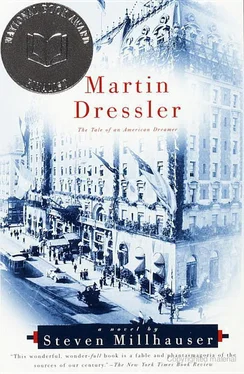And the wedding came, the wedding that he had been hearing about for a long time; it was soon over. Martin smiled and waved his hand and stepped into a waiting carriage. He was very tired. And after all he was relieved to find himself sitting beside Caroline in the carriage he had hired, rolling now through the great Park. The carriage had been decorated with wreaths of flowers, and through one window he could see a purple blossom bouncing in and out of view as it struck the side of the carriage over and over again. He wondered what kind of flower it actually was. “Look at that flower, Caroline,” he said. She sat by the window and he sat beside her, with a space between. In her white wedding dress she struck him as younger than ever — she looked like a young girl dressed up in a play about a queen. His father in his handsome rented clothes, with his thick brown mustache streaked with gray, with his pulled-back shoulders and large melancholy eyes, had looked like a gallant army officer. His mother had worn fresh flowers in her hat; when he bent to kiss her, she turned her cheek in a gesture he remembered from childhood bedtimes. It was three o’clock in the afternoon, and it occurred to Martin, leaning his head back in the soothing carnage, that there was quite a bit of day to get through. He had instructed the driver to take a few turns around the Park and then go up and down the great avenues. Then a light supper and a return to the Bellingham, where their five newly furnished rooms awaited them. It was warm in the carriage: sunlight and leafshade rippled across the dark leather seats, across Martin’s legs and Caroline’s white dress. Her hand, rippling with sun and shade, lay in her white lap. Caroline’s face was turned toward the window. Martin reached out a hand, hesitated, and then gently placed his hand on hers. Caroline stiffened and withdrew her hand as she turned to him with a startled look. “I’m sorry,” Martin said. “I didn’t mean—” “You startled me,” Caroline said, and he in turn was startled: he thought she was going to cry. But she gave an odd, childish pout and suddenly reached over and patted the back of his hand twice. Then she withdrew her hand and placed it in her lap. Martin, holding his breath, looked at her hand in her lap. He looked at her arm, at her cheekbone, at her black eyelashes and brown eyebrows and pale yellow hair. Then he let out his breath and in the warm carriage closed his eyes.
It was late dusk when they returned to the Bellingham, the time of day when the eastern sky has already turned to night and the west looks pale, almost white, so that if you turn your head back and forth — and Martin stopped, in order to show Caroline how to turn her head back and forth, but also because he had been seized by the memory of doing exactly this head-turning, at exactly this time of day, but for the life of him he couldn’t remember when. Caroline turned her head from side to side without saying anything and went with him into the lobby of the Bellingham Hotel. In the lamplit parlor he saw them, Margaret and Emmeline, sitting at the familiar table. And Martin felt a motion of irritation — why didn’t they leave him alone, why were they always surrounding him? But as he sank into the familiar chair he felt deeply soothed, it was as if all his muscles ached and now, in the soft chair in the light of the familiar lamp, among the well-known voices, he were being stroked by gentle hands. And Caroline in her chair seemed less strange to him, though he would have liked to shift her hand slightly on the red chairarm, where it had assumed an unfamiliar position, with three fingers curled under and one outstretched: a horrible, grotesque position, really, as if her hand had come to rest in a painful way from which she was unable to release it. And so he turned his face away and began to settle in, but just then Emmeline rose up before him, and beside her Margaret Vernon: they were leaving. For of course it had to be this way, on a night that was unlike other nights, however much it might look the same. And as he wondered what was going to happen next, Caroline rose, with a little stifled yawn.
All four walked over to the elevator and waited for the door to open. Together they rose in the elevator, standing in silence behind the elevator man in his maroon jacket and green pants, together they stepped out onto the fifth-floor landing. Martin held open a door with a glass window in it. Two by two they walked along the corridor, Martin and Caroline behind Emmeline and Margaret, and two by two they turned left into the next corridor. Emmeline stopped before her door and inserted the key while Mrs. Vernon said what a lovely wedding it had been and Caroline stood with lowered eyes beside Martin as he opened his own door, across the corridor from the Vernon door and five feet farther along.
“Good night,” Mrs. Vernon said.
“Good night,” said Martin.
“Good night,” Emmeline said.
“Good night,” said Caroline.
Martin held open his door for Caroline and followed her in, and as he closed the door he heard the deadbolt catch in the lock across the way.
“I’m tired,” murmured Caroline in the parlor, and rustled away through a door as Martin entered from the front hall and sank down in his flowered armchair. The chair had been moved to the new parlor from Martin’s bachelor suite on the sixth floor, and it sat uneasily amidst the new sofa, the loveseat, the stiff upholstered chairs, the mahogany rocker with its tasseled cushion. Against one wall stood a dark, shiny piano with framed photographs of Margaret with a bearded stranger, Caroline in an unfamiliar dress, Emmeline and Caroline at the age of twelve; Martin had bought the piano, even though Caroline had said she played “only a little.” One door led to a small library, with a rolltop desk, a tufted reading chair upholstered in silk damask, and mahogany bookcases with glass doors. Three shelves contained Caroline’s collection of books, mostly novels and sets of poets, and one shelf held Martin’s books: Brown’s Business Correspondence, Book-keeping at a Glance, Science for the Citizen, The Home Mechanic, Famous Battles in History, Business Pointers , and a scattering of boyhood books given to him by his mother and various aunts. The remaining shelves held Caroline’s favorite possessions: a music box with a turning ballerina, a large oyster shell, a little glass deer, and above all her many elegant dolls, seated side by side, row after row of them, princesses and soldiers and washerwomen and milkmaids and fine ladies with parasols. Martin had never seen so many dolls; something about their faces disturbed him, as if they had been caught in a moment of sadness from which they could never escape.
But he could no longer hear Caroline moving in the far rooms and rose to find her. He turned out the lamp in the parlor and passed into a room that looked like another parlor, a room whose purpose was not entirely clear to him: Caroline had called it a sitting room. From here one reached a small hall that led to the remaining rooms: the guest chamber, the bathroom, and the master bedroom.
When Martin entered the bedroom it was entirely dark, illuminated only by the dim light that entered through the door he held open. In the near-blackness he saw the dark glimmer of the wardrobe mirror and a big block of darkness that was the marriage bed. Caroline lay on the far side with the covers up to her chin and one arm on the dark coverlet. As he drew closer he saw that the arm was concealed to the frilled wrist by the white sleeve of her wedding dress — but no, coming closer he saw that it was the sleeve of some other garment, a nightdress, probably. She lay on her back with her eyes closed, her head slightly turned, her hair covering her cheek and lying bunched and shadowy on the pillow. She was asleep. And an irritation seized him, to see that she had undone her hair alone, that she had slipped into sleep as into a narrow space where he could not follow her, that of all possible solutions to the problem of the wedding night, a problem he now recognized in all its gravity, she had chosen this one. “Caroline,” he whispered, “Caroline,” and sitting down on the edge of the bed he shook her by the shoulder, which through the bedcovers he could feel in its sharpness of bone and roundness of flesh, a sharp-roundness, a contradiction. Beyond the bed sat an armchair with something hunched over the back, something that looked like a big crab — her corset in a tangle of strings. He shook her harder and her eyes opened. She sat up abruptly, pulling the covers up to her neck, but carelessly, so that a part hung down and exposed a piece of her naked white nightdress. “Caroline,” he said, struck by the note of reproach in his voice, of injury, “you didn’t say good night.”
Читать дальше












